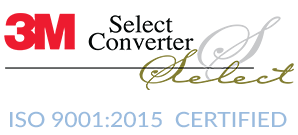Who Needs a Custom Manufacturer?
Who needs a custom manufacturer? You do!
Custom manufacturing and converting services benefit companies at all levels. From start-ups to established businesses, outsourcing your production saves you time, money, and headaches. How can Custom Converting make your life easier?
Reducing Costs:
Time is money. Doing your own manufacturing is expensive.
First, to manufacture for yourself, you have to find the right equipment, which takes research and engineering hours. Then you’re going to have to find a place in your facility to run the equipment, and you’re going to have to train employees to use it properly.
Employees are expensive, and experience costs money. You not only have to keep employees to run the equipment, you have to keep employees who know how to maintain the equipment. Labor costs are going up.
Rent and overhead are expensive. Adding manufacturing equipment to your floor costs you money every day of the year, not just the days you die cut, slit, or coat adhesive. Most converting equipment has a large footprint, and it doesn’t fold up and store in the corner.
Negotiating relationships with materials suppliers is time-consuming. We negotiate the best prices from established vendors. Why not let us supply your materials? As a 3M Select converter, we can obtain materials unavailable to the public.
Who needs a custom manufacturer? Businesses who want to save money.
Increased Quality and Scalability:
Working with a custom manufacturer allows you to try new ideas. Because you’re not worrying about the details of manufacturing, you can spend that time pursuing creativity and doing market research. Smaller runs allow you to pivot quickly, responding to your customers’ desires. When time is ripe, we can scale up and get millions of parts to you in a timely fashion.
Leave the learning curve to us. We can produce high-quality products because we’ve been doing it for 40 years. Quality is in our DNA, and our customers love us.
We worked with Dan before the pandemic and built a relationship with him. When the pandemic hit, we shipped him millions of parts, even adding a second shift to fulfill his requirements. After the pandemic was over, his need for die cut parts dropped back down; and we still die-cut those parts for him. Does Dan have to worry about employees or equipment investments as demand fluctuates? No! We take care of it for him, and we’ll continue to do so.
Who needs a custom manufacturer? Businesses who want to respond quickly to shifts in demand, and who want to bring a high-quality product to their customers quickly.
Options:
What does it mean to do business with a custom converter? It means that you can utilize any of the capabilities that we have in order to manufacture your product or products. If you’re wondering if we’re the custom manufacturer that you’re looking for, please contact us.
We can provide components for you because we have access to the full 3M catalog of adhesives. Some of our clients only use us to get these materials.
We can provide converting services for a part or parts of your manufacturing process. Some of our clients deliver specialized materials to our dock that we then die cut and return, with or without packaging.
We can provide end-to-end manufacturing services, from purchasing through final packaging, shipping you a product ready to put on the shelf.
Who needs a custom manufacturer? Businesses who want options.
Knowledge is Power:
We will give you a detailed and accurate quotation up front, before beginning the manufacturing process or your issue of a purchase order. This is vital to any business, but it is especially useful for start-ups, or anyone making pricing decisions. Don’t guess how much your product is going to cost – know.
With 40 years of experience, we can help you find solutions to your challenges. Why not make an appointment with our team? Because of the years we’ve been in the business, we’ve had a chance to try making a wide variety of products. We’re happy to share that experience with you. Face-to-face relationships built on trust can last for years, and it does, with Custom Converting.
Who needs a custom manufacturer? Businesses who want to know more.
Made in the U.S.A.
If you work with American-made raw materials and/or components, keep your production onshore and get that “Made in the U.S.A.” seal. This standard is becoming increasingly important to your customers – we’ve heard that large retailers are actively sorting vendors by where they’re manufacturing their product.
Working with a custom manufacturer located in the United States also avoids some of the problems we came across during the years of the pandemic. Supply lines were cut, overseas deliveries were in huge queues, and what was supposed to make everyone’s life easier and faster became a huge hassle.
The global economy is fraught with hazards as of this writing. Not only are shipping boats being hijacked in some parts of the world, there is a chance that we might be at war (or in a proxy war) with countries that are home to many international manufacturers. Do you want your business to collapse if China fires on Taiwan? Bringing your converting and manufacturing home just makes sense.
Who needs a custom manufacturer located in the United States? Businesses who want to mark their goods, “Made in the U.S.A.” and businesses who want to avoid the dangers inherent in depending on offshore manufacturing partners.
Conclusion:
Custom manufacturing and converting services benefit can benefit nearly every business. If you’re looking to save money, bring great products to your customers, and reduce your stress, then this option is for you.
You can contact us via phone (760) 724-0664, via the form on our site, or by emailing the attached form to sales@customconverting.com.
We look forward to hearing from you soon.

